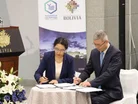CATL & YLB Partner to Trial Direct Lithium Extraction Tech

Despite Bolivia being host to the most lithium in the world — in the region of 20 million tonnes — production is not yet plentiful. As electric vehicle production increases, the demand for lithium increases, as it is a crucial element of the batteries.
Chinese consortium CATL, the world’s largest battery maker for EVs has partnered with Bolivian state-owned lithium company YLB to use Direct Lithium Extraction (DLE) technology on a pilot plant on the Uyuni salt flat.
The project, which hopes to produce lithium in the first 18 months, will see the construction of a 2,500 tonnes-per-year lithium carbonate facility that will be operated by the CBC consortium.
As the DLE technology is fairly young, the partners are looking to see the feasibility of larger projects in the future.
“The pilot has important strategic significance for both parties,” shares Qinghua Zhou, CEO and Managing Director of CBC.
“CBC will use its advanced technology and experience to carry out the pilot tests, making Bolivia an important global centre of the lithium battery industry chain.”
Lithium mining for sustainable transport
In 2022, world output of lithium carbonate equivalent (LCE), a semi-processed form of the metal, was 737,000 tonnes. This increased to around 985,000 tonnes in 2023 according to the latest report from Australian Department of Industry, Science and Resources. This steep increase indicates the speed of increasing demand for lithium, thanks to the rising sales of electric vehicles. Sales of EVs are forecast to grow by tens of millions of vehicles by 2030, and experts are concerned that the demand for minerals and elements such as lithium, copper and nickel is going to be extremely challenging to reach. According to recent figures from intelligence specialist S&P Global, by 2030 the market demand for lithium-ion batteries for light vehicles will hit around 3.4 Terawatt hours (TWh) annually, with the current output for the auto industry is just 0.30 TWh.
The successful development of the DLE technology in Bolivia could be groundbreaking in increasing production of lithium, and supporting the uptake of sustainable transport globally.
******
Make sure you check out the latest industry news and insights at Mining Digital and also sign up to our global conference series - Manufacturing LIVE 2024
******
Mining Digital is a BizClik brand
*************
